Browse By Unit
1.6 Market Equilibrium, Disequilibrium, and Changes in Equilibrium
3 min read•june 18, 2024
Jeanne Stansak
Isabela Padilha
Jeanne Stansak
Isabela Padilha
Market Equilibrium
Market equilibrium is a condition in a market where the quantity supplied equals the quantity demanded at an optimal price level. This occurs as a result of voluntary exchange. Through voluntary exchange, consumers and firms mutually benefit in the marketplace, as utility and profits are maximized. When a market is in equilibrium, it is allocatively efficient, and consumer and producer surplus is maximized.
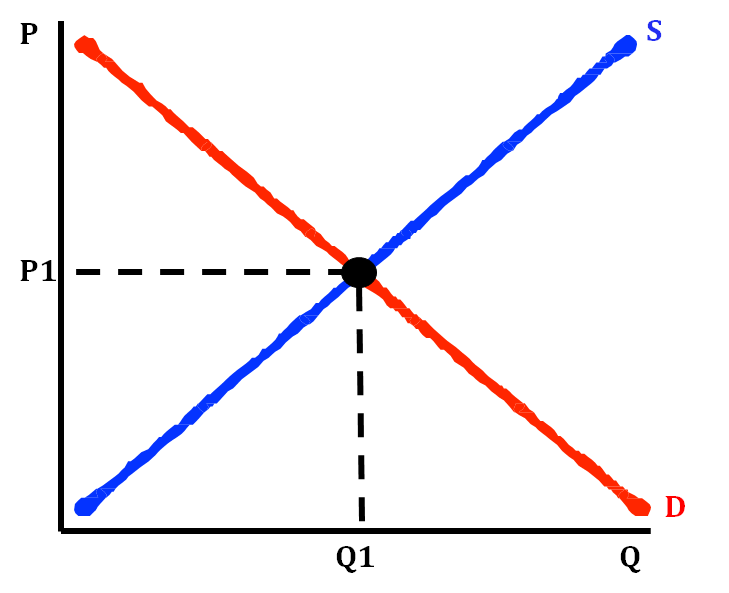
Market Disequilbrium
Prices naturally fluctuate away from equilibrium, which causes market disequilibrium. 🥴
When there is an increase in the price level, firms have an incentive to supply a greater quantity in order to maximize profits. However, the quantity demanded decreases as consumers are less willing or able to buy. This causes a condition in a market where the price level has risen too high, causing quantity supplied to be greater than the quantity demanded. This is known as a market surplus (see graph below).
When there is a decrease in the price level, consumers demand a greater quantity, as goods are less expensive. However, the quantity supplied decreases as firms lose the incentive to supply the same quantity at lower prices. This causes a condition in a market where the price level has fallen too low, causing the quantity demanded to be greater than the quantity supplied. This is known as a market shortage (see graph below).
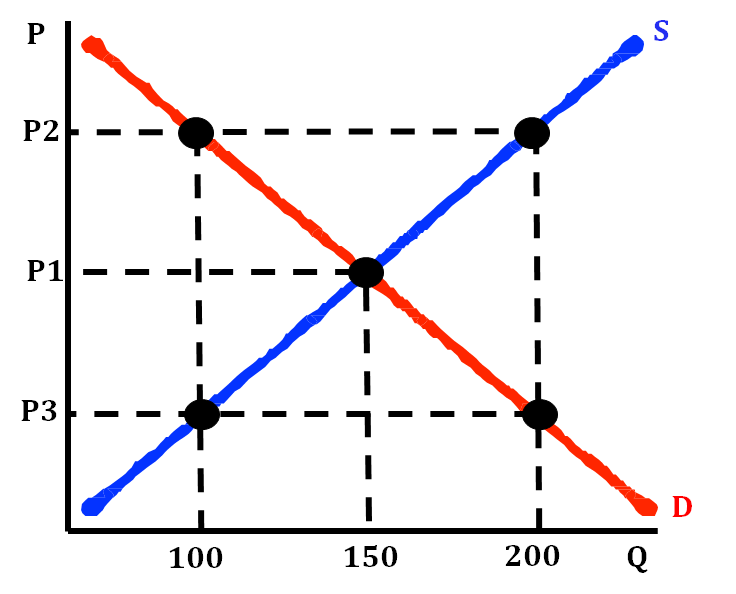
When the price decreases from P1 to P3, there is an increase in the quantity demanded (150 units to 200 units), and there is a decrease in the quantity supplied (150 units to 100 units).
At P3, the quantity demanded is 200 and the quantity supplied is 100, so there is a shortage of 100 units. This means that consumers want more goods than producers are willing to make.
When the price increases from P1 to P2, there is a decrease in the quantity demanded (150 units to 100 units), and there is an increase in the quantity supplied (150 units to 200 units).
At P2, the quantity demanded is 100 and the quantity supplied is 200, so there is a surplus of 100 units.
Changes in Market Equilibrium
When the determinants of demand (I-N-S-E-C-T) and the determinants of supply (R-O-T-T-E-N) cause changes in either demand or supply, then there is a change in market equilibrium. There are four potential changes that cause market price and quantity to change:
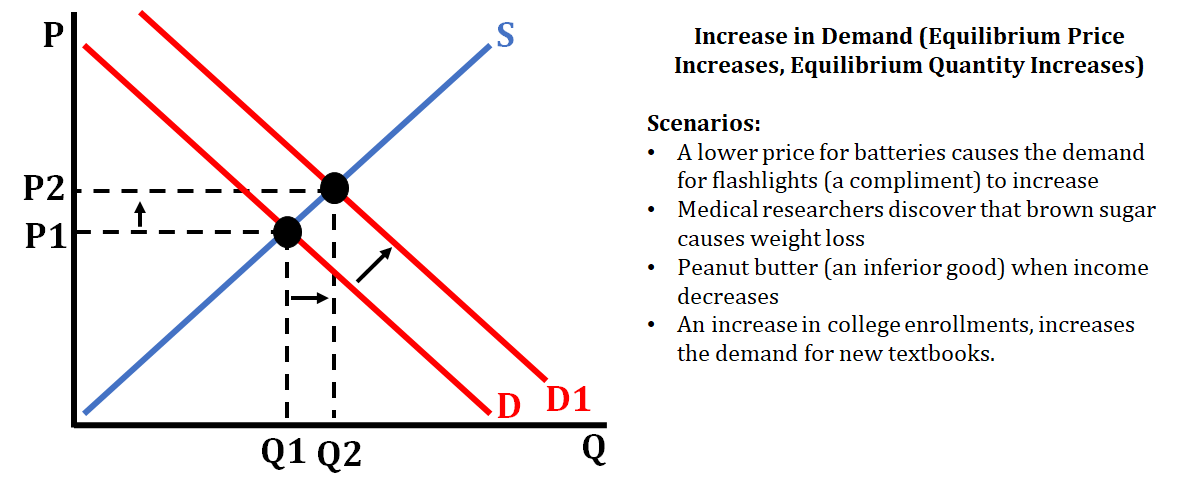
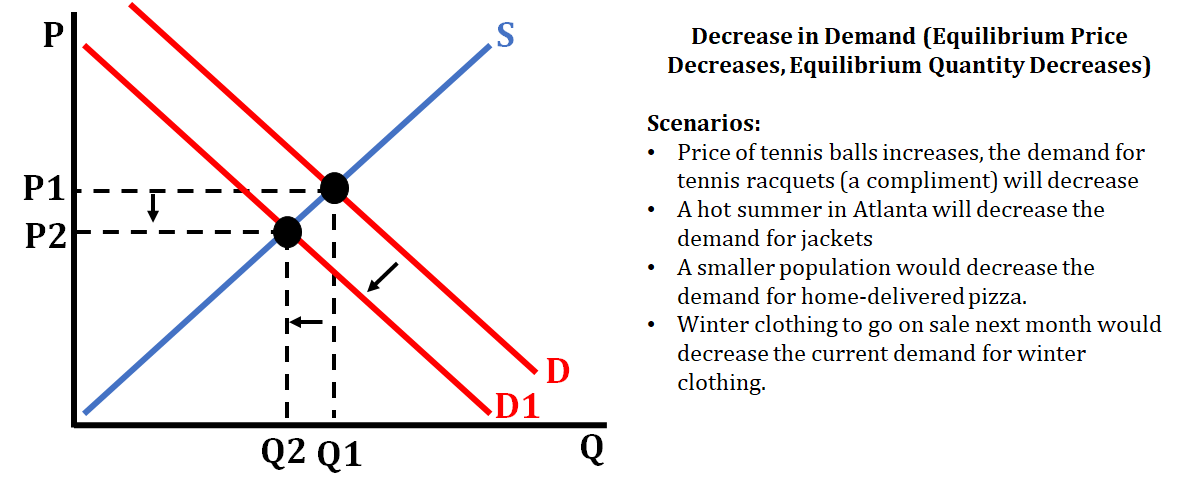
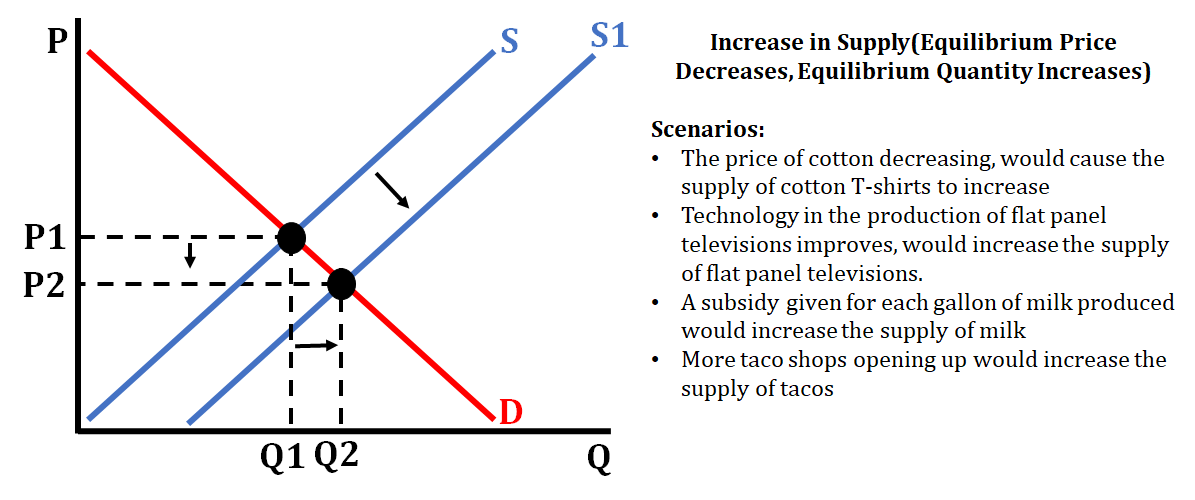
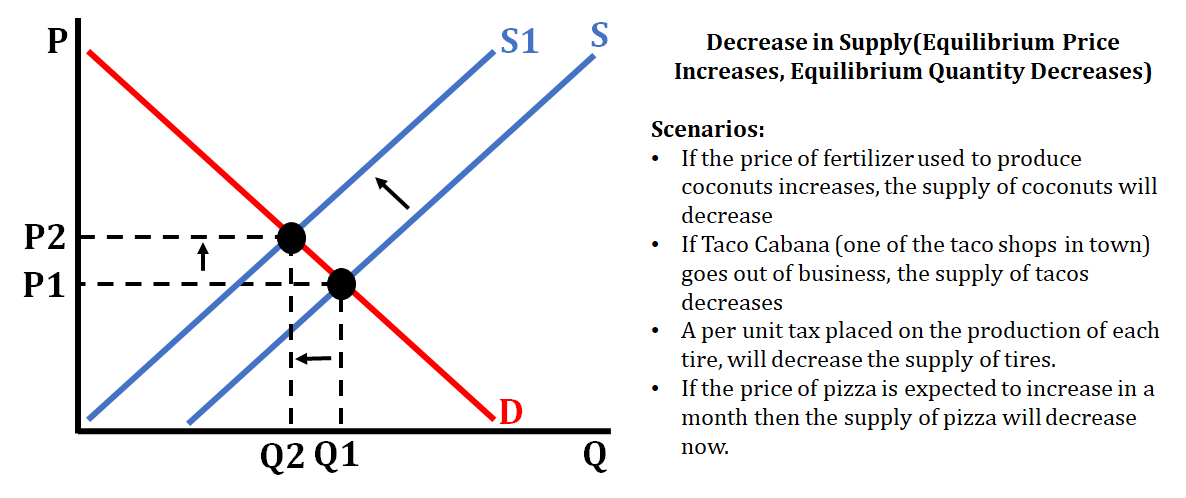
Recap of the topic:
Key concepts:
- Market surplus - quantity of a good or service that is available exceeds the quantity demanded by consumers.
- Market Shortage - quantity of a good or service that is available is less than the quantity demanded by consumers.
Changes in Equilibrium:
-
Increase in Demand - Equilibrium price ⬆️, Equilibrium quantity ⬆️
-
Decrease in Demand - Equilibrium price ⬇️, equilibrium quantity ⬇️
-
Increase in Supply - Equilibrium price ⬇️, Equilibrium quantity ⬆️
-
Decrease in Supply - Equilibrium price inc ⬆️, equilibrium quantity ⬇️
<< Hide Menu
1.6 Market Equilibrium, Disequilibrium, and Changes in Equilibrium
3 min read•june 18, 2024
Jeanne Stansak
Isabela Padilha
Jeanne Stansak
Isabela Padilha
Market Equilibrium
Market equilibrium is a condition in a market where the quantity supplied equals the quantity demanded at an optimal price level. This occurs as a result of voluntary exchange. Through voluntary exchange, consumers and firms mutually benefit in the marketplace, as utility and profits are maximized. When a market is in equilibrium, it is allocatively efficient, and consumer and producer surplus is maximized.

Market Disequilbrium
Prices naturally fluctuate away from equilibrium, which causes market disequilibrium. 🥴
When there is an increase in the price level, firms have an incentive to supply a greater quantity in order to maximize profits. However, the quantity demanded decreases as consumers are less willing or able to buy. This causes a condition in a market where the price level has risen too high, causing quantity supplied to be greater than the quantity demanded. This is known as a market surplus (see graph below).
When there is a decrease in the price level, consumers demand a greater quantity, as goods are less expensive. However, the quantity supplied decreases as firms lose the incentive to supply the same quantity at lower prices. This causes a condition in a market where the price level has fallen too low, causing the quantity demanded to be greater than the quantity supplied. This is known as a market shortage (see graph below).

When the price decreases from P1 to P3, there is an increase in the quantity demanded (150 units to 200 units), and there is a decrease in the quantity supplied (150 units to 100 units).
At P3, the quantity demanded is 200 and the quantity supplied is 100, so there is a shortage of 100 units. This means that consumers want more goods than producers are willing to make.
When the price increases from P1 to P2, there is a decrease in the quantity demanded (150 units to 100 units), and there is an increase in the quantity supplied (150 units to 200 units).
At P2, the quantity demanded is 100 and the quantity supplied is 200, so there is a surplus of 100 units.
Changes in Market Equilibrium
When the determinants of demand (I-N-S-E-C-T) and the determinants of supply (R-O-T-T-E-N) cause changes in either demand or supply, then there is a change in market equilibrium. There are four potential changes that cause market price and quantity to change:




Recap of the topic:
Key concepts:
- Market surplus - quantity of a good or service that is available exceeds the quantity demanded by consumers.
- Market Shortage - quantity of a good or service that is available is less than the quantity demanded by consumers.
Changes in Equilibrium:
-
Increase in Demand - Equilibrium price ⬆️, Equilibrium quantity ⬆️
-
Decrease in Demand - Equilibrium price ⬇️, equilibrium quantity ⬇️
-
Increase in Supply - Equilibrium price ⬇️, Equilibrium quantity ⬆️
-
Decrease in Supply - Equilibrium price inc ⬆️, equilibrium quantity ⬇️

© 2024 Fiveable Inc. All rights reserved.